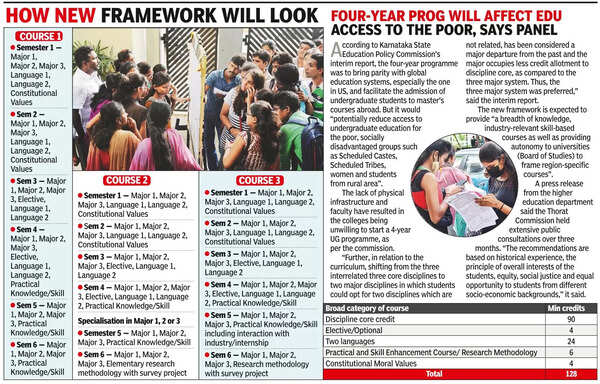- News
- City News
- bengaluru News
- Karnataka- Change in degree: UG courses in three new formats, two-language policy will continue
Trending
Karnataka- Change in degree: UG courses in three new formats, two-language policy will continue
Karnataka's UG courses to revamp in 2024-25 following State Education Policy Commission's recommendations. Changes include related electives, value education, two-language policy, internships, majors, industry interaction, and exam pattern revision for better curriculum alignment.

Image used for representative purpose only
BENGALURU: UG courses in the state will come in three new formats beginning academic year 2024-25, as recommended in the interim report of Karnataka State Education Policy Commission under the chairpersonship of Prof Sukhdev Thorat.
The major changes recommended include having an elective that is related to the major, unlike the scrapped National Education Policy (NEP) where the subject had to be unrelated and a value education course with emphasis on Constitutional principles.The two-language policy and emphasis on internships continue. However, there is no mention of environmental studies.

Colleges can offer degrees with three majors with a general degree in all six semesters; three majors up to fourth semester, and specialisation in one subject in fifth and sixth semester or; a single subject specialisation from the first semester with minors. In addition to majors and specialisation courses, three subjects will be compulsory. First, a course with practical (skill) orientation which is linked to the theoretical major course and is expected to improve employability. Students are expected to learn two languages: Kannada/other Indian languages, and English. The course should not only give the knowledge of the language but also, the communication skills.
One elective that can be selected by the student based on the availability of courses may be discipline-based or distinctly related to discipline-based majors. “Thus, the elective course should be supportive of the major discipline-based core course”, unlike NEP where students had to mandatorily opt from a different stream. The commission has suggested that in all courses, a tutorial or assignment with a project component based on the survey which will give or involve practical experience may be included. Interaction with industry should be made a part of the course. The Board of Studies (BoS) of universities are expected to interact with industries and evolve industry related component in the curriculum wherever applicable and design syllabus that reflects the societal needs.
It is suggested that an elementary level research methodology course with a tutorial based on the survey/laboratory be introduced for the single-subject specialisation and deep specialisation in the 5th and the 6th semesters. The examination pattern will be 80:20—80 for the semester-end exam, and 20 for internal assessment.
The BoS has to develop a syllabus based on the curricular framework suggested in the three cases. “Within a university, each department may innovatively use the framework and different departments may come out with unique combinations of major, elective (optional), and compulsory courses. This allows diversity based on regional specification in the curricula as well as growth depending on the decisions of each BoS,” said the report.
The major changes recommended include having an elective that is related to the major, unlike the scrapped National Education Policy (NEP) where the subject had to be unrelated and a value education course with emphasis on Constitutional principles.The two-language policy and emphasis on internships continue. However, there is no mention of environmental studies.

Colleges can offer degrees with three majors with a general degree in all six semesters; three majors up to fourth semester, and specialisation in one subject in fifth and sixth semester or; a single subject specialisation from the first semester with minors. In addition to majors and specialisation courses, three subjects will be compulsory. First, a course with practical (skill) orientation which is linked to the theoretical major course and is expected to improve employability. Students are expected to learn two languages: Kannada/other Indian languages, and English. The course should not only give the knowledge of the language but also, the communication skills.
The third compulsory subject is value or moral education which will include teaching constitutional moral values/principles of equality, liberty, fraternity, national unity, and non-discrimination and similar values. Students should be made aware of the current situation which is “contradictory to the constitutional principles”. Practical experience through tutorial assignment and based on a small survey should be conducted.
One elective that can be selected by the student based on the availability of courses may be discipline-based or distinctly related to discipline-based majors. “Thus, the elective course should be supportive of the major discipline-based core course”, unlike NEP where students had to mandatorily opt from a different stream. The commission has suggested that in all courses, a tutorial or assignment with a project component based on the survey which will give or involve practical experience may be included. Interaction with industry should be made a part of the course. The Board of Studies (BoS) of universities are expected to interact with industries and evolve industry related component in the curriculum wherever applicable and design syllabus that reflects the societal needs.
It is suggested that an elementary level research methodology course with a tutorial based on the survey/laboratory be introduced for the single-subject specialisation and deep specialisation in the 5th and the 6th semesters. The examination pattern will be 80:20—80 for the semester-end exam, and 20 for internal assessment.
The BoS has to develop a syllabus based on the curricular framework suggested in the three cases. “Within a university, each department may innovatively use the framework and different departments may come out with unique combinations of major, elective (optional), and compulsory courses. This allows diversity based on regional specification in the curricula as well as growth depending on the decisions of each BoS,” said the report.
End of Article
FOLLOW US ON SOCIAL MEDIA










